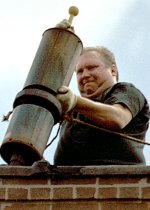German Firm Moves 4,000 Kelowna Jobs to U.S. Auto Industry Squeeze Hits Hard  North America is the world’s richest industrial economy, with the most productive workforce on earth. But for how much longer? What will be left if we continue selling off our best jobs? Revitalizing North America's Might Return to Contents Page |
Dutch Vacuum 200 Jobs From Bloomington Normal Like
any good union rep, Diane Scheel saves everything. Her kitchen table
overflows with newspaper articles, union newsletters and company
publications –– a 45-year record of Eureka ramping up production in
Mexico and cutting back, laying off and, finally closing its production
plants in Illinois. When
Scheel went to work at Eureka in 1965, she never dreamed laws like NAFTA
would condemn someone to work at her job, for pennies an-hour, in an
environmental cesspool down in Mexico. For
Scheel, working at Eureka was a family tradition. “My grandfather
started with the company in 1932. My father and my uncle worked for
Eureka. It was that way for a lot of families in town.” The
late 1960s and early 1970s were a boom time for the Eureka Co. More than
2,000 people worked at the Bloomington plant. While Eureka battled
arch-rival Hoover for the number one spot in vacuum sales, the Vietnam
War was raging and the plant was busy producing aircraft and missiles
parts, as well as vacuum cleaners. “We
made a decent living,” Scheel recalls. “We were part of the middle
class.” In
1974 the Dutch conglomerate Electrolux purchased Eureka. The company
became one of 500 businesses operated by the global giant in 50
different countries. In
1981, Electrolux opened a 66,000 square-foot plant in Juarez, Mexico to
manufacture vacuum cleaner bags and motors. They also opened a nonunion
warehouse and distribution center directly across the border in El Paso,
Texas. Company officials insisted the new facilities would have “very
little effect” on employment in Illinois. When
Electrolux moved 200 jobs to El Paso in August 1990, the IAM responded
with a public relations barrage. The union held rallies, lobbied local
and state politicians, wrote letters to the newspaper, and helped
initiate trade hearings. They even set up a cardboard “house” in
front of the company’s main entrance, like those the Juarez employees
lived in. The
campaign worked, said Scheel. “Management admitted later we’d kicked
their butts good!” In
the summer of 1999, the company announced it was closing its Illinois
facilities. While the layoffs were clearly NAFTA-related, Scheel and
other IAM leaders spent months lobbying the White House, Congress and
the Labor Department for extended unemployment benefits, job re-training
and benefits under the Trade Readjustment Act.
|




